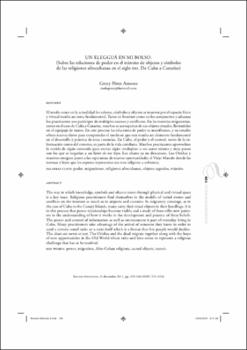Un Elegguá en mi bolso (Sobre las relaciones de poder en el tránsito de objetos y símbolos de las religiones afrocubanas en el siglo XXI. De Cuba a Canarias)
Autor
Pérez Amores, Grecy
Fecha
2011Resumen
El modo como en la actualidad los saberes, símbolos y objetos se mueven por el espacio físico
y virtual resulta un tema fundamental. Tanto en Internet como en los aeropuertos y aduanas
los practicantes son partícipes de múltiples sucesos y conflictos. En las travesías migratorias,
como en el caso de Cuba a Canarias, muchos se acompañan de sus objetos rituales, llevándolos
en el equipaje de mano. En este proceso las relaciones de poder se manifiestan, y su estudio
ofrece nuevas claves para comprender el modo en que este resulta un elemento fundamental
en el desarrollo y práctica de estas creencias. En Cuba, el poder y el control, tanto de la información
como del entorno, es parte de la vida cotidiana. Muchos practicantes aprovechan
la venida de algún conocido para enviar algún «trabajito» o un santo mismo y muy pocos
son los que se negarían a un favor de ese tipo. Los altares ya no descansan. Los Orishas y
muertos emigran junto a las esperanzas de nuevas oportunidades al Viejo Mundo donde las
normas y leyes que les esperan representan un reto religioso a solventar. The way in which knowledge, symbols and objects move through physical and virtual space
is a key issue. Religious practitioners find themselves in the middle of varied events and
conflicts on the internet as much as in airports and customs. In migratory crossings, as in
the case of Cuba to the Canary Islands, many carry their ritual objects in their handbags. It is
in this process that power relationships become visible and a study of these offer new pointers
to the understanding of how it works in the development and practice of these beliefs.
The power and control of information as well as environment is part of everyday living in
Cuba. Many practitioners take advantage of the arrival of someone they know in order to
send a certain «small task» or a saint itself which is a favour that few people would decline.
The altars are never at rest. The Orishas and the dead migrate together along with the hope
of new opportunities in the Old World where rules and laws come to represent a religious
challenge that has to be resolved.





